英语人教版七年级上册如何变一般疑问句
- 格式:doc
- 大小:16.50 KB
- 文档页数:1
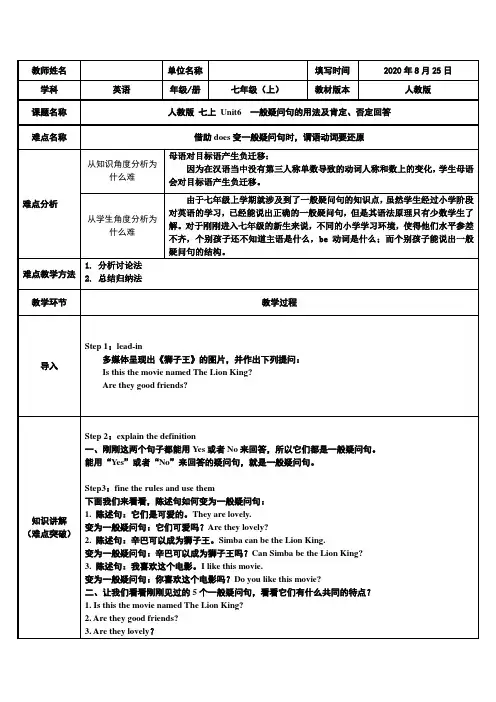
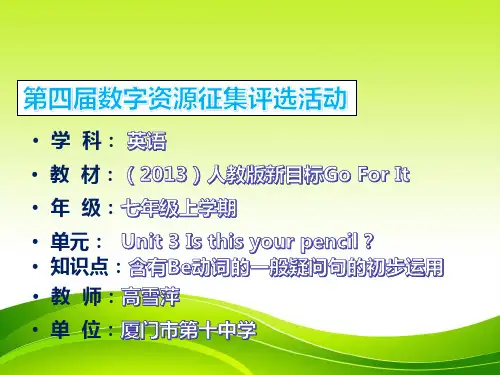
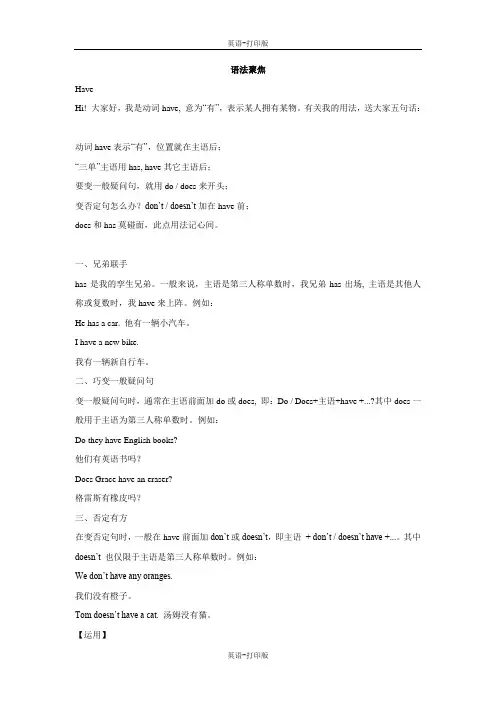
语法聚焦HaveHi! 大家好,我是动词have, 意为“有”,表示某人拥有某物。
有关我的用法,送大家五句话:动词have表示“有”,位置就在主语后;“三单”主语用has, have其它主语后;要变一般疑问句,就用do / does来开头;变否定句怎么办?don’t / doesn’t加在have前;does和has莫碰面,此点用法记心间。
一、兄弟联手has是我的孪生兄弟。
一般来说,主语是第三人称单数时,我兄弟has出场, 主语是其他人称或复数时,我have来上阵。
例如:He has a car. 他有一辆小汽车。
I have a new bike.我有一辆新自行车。
二、巧变一般疑问句变一般疑问句时,通常在主语前面加do或does, 即:Do / Does+主语+have +...?其中does一般用于主语为第三人称单数时。
例如:Do they have English books?他们有英语书吗?Does Grace have an eraser?格雷斯有橡皮吗?三、否定有方在变否定句时,一般在have前面加don’t或doesn’t,即主语+ don’t / doesn’t have +...。
其中doesn’t 也仅限于主语是第三人称单数时。
例如:We don’t have any oranges.我们没有橙子。
Tom doesn’t have a cat. 汤姆没有猫。
【运用】根据括号内的提示完成各题。
1. Sally ______(有) a tennis racket.2. They ______(有) many good friends.3. ______ he ______(有) a volleyball?4. I have a computer. (变为一般疑问句) ______________________________5. His uncle has a soccer ball.(变为否定句)______________________________语法聚焦1. has2. have3. Does, have4. Do you have a computer?5. His uncle doesn’t have a soccer ball.。
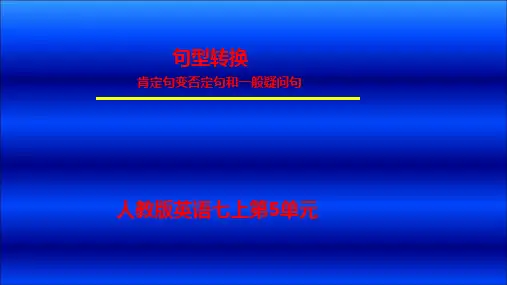
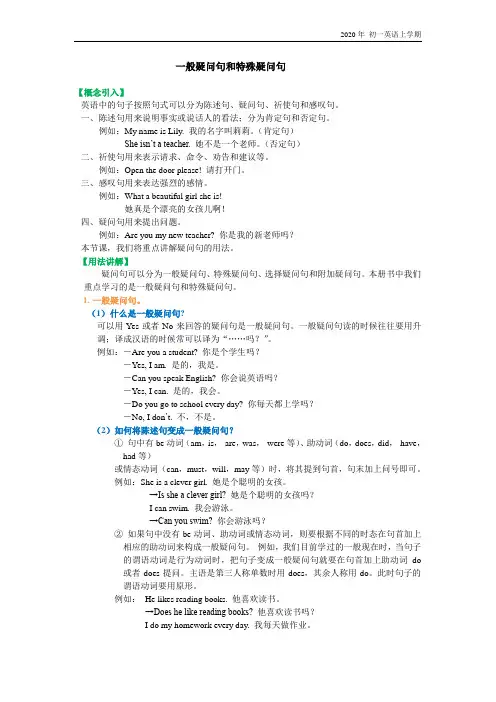
一般疑问句和特殊疑问句【概念引入】英语中的句子按照句式可以分为陈述句、疑问句、祈使句和感叹句。
一、陈述句用来说明事实或说话人的看法;分为肯定句和否定句。
例如:My name is Lily. 我的名字叫莉莉。
(肯定句)She isn’t a teacher. 她不是一个老师。
(否定句)二、祈使句用来表示请求、命令、劝告和建议等。
例如:Open the door please! 请打开门。
三、感叹句用来表达强烈的感情。
例如:What a beautiful girl she is!她真是个漂亮的女孩儿啊!四、疑问句用来提出问题。
例如:Are you my new teacher? 你是我的新老师吗?本节课,我们将重点讲解疑问句的用法。
【用法讲解】疑问句可以分为一般疑问句、特殊疑问句、选择疑问句和附加疑问句。
本册书中我们重点学习的是一般疑问句和特殊疑问句。
1.一般疑问句。
(1)什么是一般疑问句?可以用Yes或者No来回答的疑问句是一般疑问句。
一般疑问句读的时候往往要用升调;译成汉语的时候常可以译为“……吗?”。
例如:-Are you a student? 你是个学生吗?-Yes, I am. 是的,我是。
-Can you speak English? 你会说英语吗?-Yes, I can. 是的,我会。
-Do you go to school every day? 你每天都上学吗?-No, I don’t. 不,不是。
(2)如何将陈述句变成一般疑问句?①句中有be动词(am,is,are,was,were等)、助动词(do,does,did,have,had等)或情态动词(can,must,will,may等)时,将其提到句首,句末加上问号即可。
例如:She is a clever girl. 她是个聪明的女孩。
→Is she a clever girl? 她是个聪明的女孩吗?I can swim. 我会游泳。
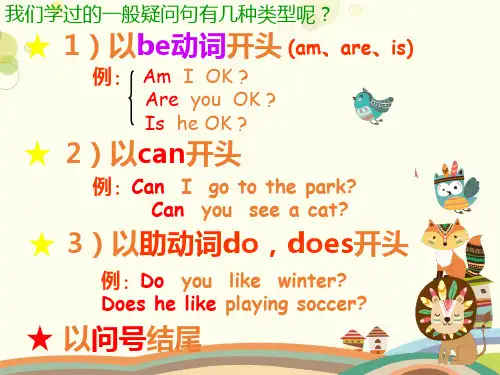
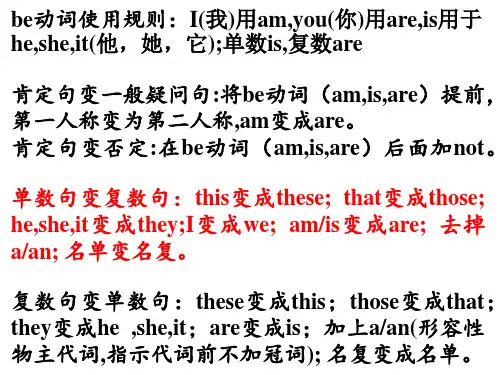
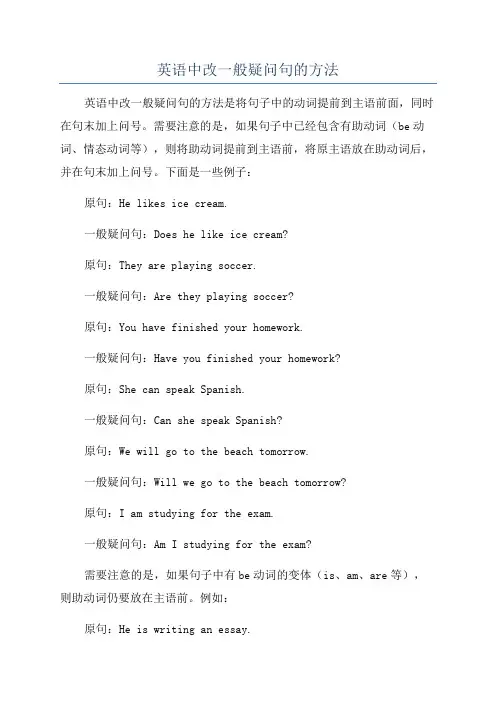
英语中改一般疑问句的方法
英语中改一般疑问句的方法是将句子中的动词提前到主语前面,同时在句末加上问号。
需要注意的是,如果句子中已经包含有助动词(be动词、情态动词等),则将助动词提前到主语前,将原主语放在助动词后,并在句末加上问号。
下面是一些例子:
原句:He likes ice cream.
一般疑问句:Does he like ice cream?
原句:They are playing soccer.
一般疑问句:Are they playing soccer?
原句:You have finished your homework.
一般疑问句:Have you finished your homework?
原句:She can speak Spanish.
一般疑问句:Can she speak Spanish?
原句:We will go to the beach tomorrow.
一般疑问句:Will we go to the beach tomorrow?
原句:I am studying for the exam.
一般疑问句:Am I studying for the exam?
需要注意的是,如果句子中有be动词的变体(is、am、are等),则助动词仍要放在主语前。
例如:
原句:He is writing an essay.
一般疑问句:Is he writing an essay?
原句:I am not feeling well.
一般疑问句:Am I not feeling well? 或 Aren't I feeling well?。

.
含有动词be动词的一般疑问句四大考点
1. 以be动词开头的一般疑问句的构造为:be动词+主语+表语〔名词、数词等〕。
例如:—Is this your pencil? 这是你的铅笔吗?
—Yes,it is. / No, it isn’t. 是的,是我的。
/ 不,不是我的。
2. 将肯定的陈述句变为否认的陈述句的方法:找到be动词,在be动词之后加上not 就可以了,其他的不变。
例如:〔肯定的陈述句〕This is my bike.
〔否认的陈述句〕This is not my bike.---- This isn’t my bike.
3. 将陈述句变为一般疑问句时,应将be动词移到主语之前并大写其首字母,句末标点用问号,其他句子成分照搬。
〔注意,my变your,其他人称不变〕。
例如:This is my bike. 这是我的自行车。
→Is this your bike?这是你的自行车吗?
4. 一般疑问句通常用yes或no来答复。
例如:—Are you Gina? 你是吉娜吗?
—Yes, I am. / No, I’m not.是的,我是。
/ 不,我不是。
有些一般疑问句也可以用其他形式来答复。
例如:—Is this Gina’s book?这是吉娜的书吗?
—Sorry, I don’t know.对不起,我不知道。
下载后可自行编辑修改,页脚下载后可删除。
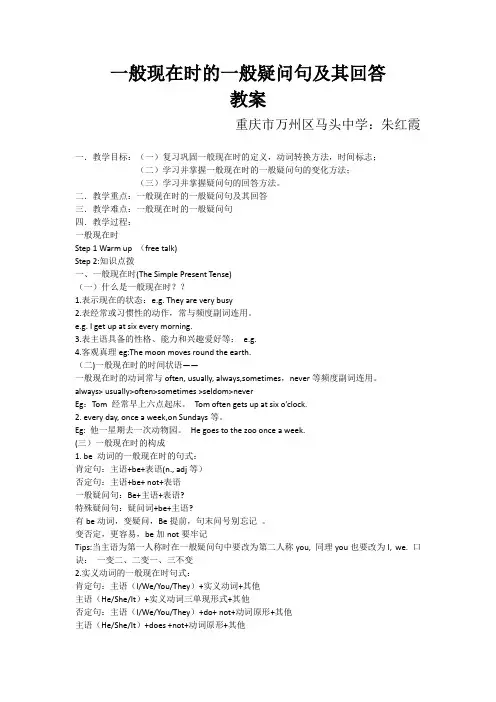
一般现在时的一般疑问句及其回答教案重庆市万州区马头中学:朱红霞一.教学目标:(一)复习巩固一般现在时的定义,动词转换方法,时间标志;(二)学习并掌握一般现在时的一般疑问句的变化方法;(三)学习并掌握疑问句的回答方法。
二.教学重点:一般现在时的一般疑问句及其回答三.教学难点:一般现在时的一般疑问句四.教学过程:一般现在时Step 1 Warm up (free talk)Step 2:知识点拨一、一般现在时(The Simple Present Tense)(一)什么是一般现在时??1.表示现在的状态:e.g. They are very busy2.表经常或习惯性的动作,常与频度副词连用。
e.g. I get up at six every morning.3.表主语具备的性格、能力和兴趣爱好等:e.g.4.客观真理eg:The moon moves round the earth.(二)一般现在时的时间状语——一般现在时的动词常与often, usually, always,sometimes,never等频度副词连用。
always> usually>often>sometimes >seldom>neverEg:Tom 经常早上六点起床。
Tom often gets up at six o’clock.2. every day, once a week,on Sundays等。
Eg: 他一星期去一次动物园。
He goes to the zoo once a week.(三)一般现在时的构成1. be 动词的一般现在时的句式:肯定句:主语+be+表语(n., adj等)否定句:主语+be+ not+表语一般疑问句:Be+主语+表语?特殊疑问句:疑问词+be+主语?有be动词,变疑问,Be提前,句末问号别忘记。
变否定,更容易,be加not要牢记Tips:当主语为第一人称时在一般疑问句中要改为第二人称you, 同理you也要改为I, we. 口诀:一变二、二变一、三不变2.实义动词的一般现在时句式:肯定句:主语(I/We/You/They)+实义动词+其他主语(He/She/It)+实义动词三单现形式+其他否定句:主语(I/We/You/They)+do+ not+动词原形+其他主语(He/She/It)+does +not+动词原形+其他一般疑问句:Do+主语(I/we/you/they)+动词原形+其他?Does+主语(he/she/it)+动词原形+其他?特殊疑问句:疑问词+ do/does+主语+动词原形+其他复习动词三单式1)动词三单形式变化规律1. 一般情况下,直接在词尾加()eg: work---works2. 以x, s, o, sh, ch结尾的动词,在词尾加( )eg: wash—washes watch—watches3. 以辅音字母加y 结尾的动词,把y 变为( ) 加( ) eg:study—studies练习:do --fix-- go -- read -- look-- wash-- pass-- play-- enjoy-- watch-- teach-- carry--box-- study-- swim--谓语为实义动词,变疑问,一二人称和复数do 提前,三单把does 来帮助,句末问号别忘记变否定,也容易,do/does加not就OK!Step3、拓展练习How much______it______?(cost)2.The shop___________(close)at this time of day.3.My teacher often_________(tell)us not to play on thestreet.4.Light___________(travel)much faster than sound.Step4 一般现在时专项练习1.This is my pencil ? (变一般疑问句your pencil ?2. These r ed socks are Kate’s . (变一般疑问句socks Kate’s ?3. I want to buy a big green bag . (变特殊疑问句you want to buy ?4. Mary does not have any books . (变肯定句)Mary books .5. The clothing shop is on sale . (变为否定句)6. She likes the black bag very much . (变为否定句)7. I buy the pants for only 50 Yuan. (用she改写句子)the pants for only 50 Yuan.8. It’对画线部分提问)9. 对画线部分提问)Lily and Lucy ?10. Her dog is 2 years and 5 months old . (变为否定句)Her dog 2 years and 5 months old .11. I usually get up at seven o’clock . (用he改写句子)at seven o’clock .12. He often has hamburger and apples for dinner . (变为一般疑问句)13. My family always like thrillers . (对画线部分提问)your family always like ?14. Jane’s sister wants to see the comedy . (变为一般疑问句)’15. 对画线部分提问) Maria and Jack come to this school ?16. 对画线部分提问Titanic ?17. I think this documentary is boring . (变复数句)think boring .18. 对画线部分提问) ?19. Julia and her mother can live (居住) in the same city . (变一般疑问句)Julia and her mother live in the same city ?20. The teacher wants to join a music club . (变为特殊疑问句)the teacher want to join ?二.用be动词的适当形式填空。
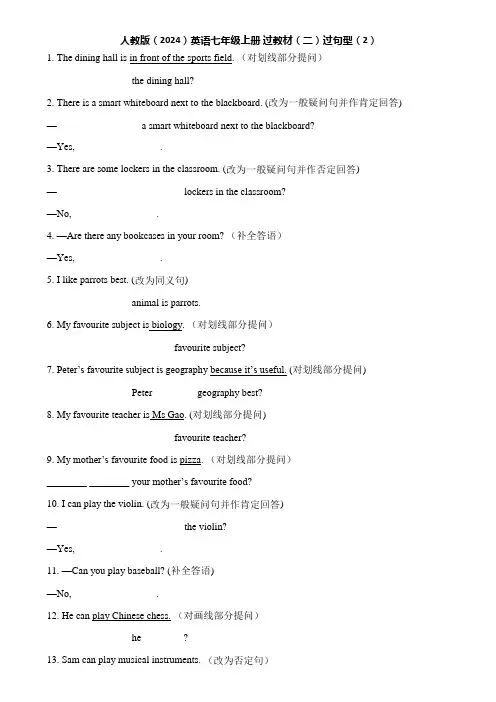
人教版(2024)英语七年级上册过教材(二)过句型(2)1. The dining hall is in front of the sports field. (对划线部分提问)________ ________ the dining hall?2. There is a smart whiteboard next to the blackboard. (改为一般疑问句并作肯定回答) —________ ________ a smart whiteboard next to the blackboard?—Yes, ________ ________.3. There are some lockers in the classroom. (改为一般疑问句并作否定回答)—________ ________ ________ lockers in the classroom?—No, ________ ________.4. —Are there any bookcases in your room? (补全答语)—Yes, ________ ________.5. I like parrots best. (改为同义句)________ ________ animal is parrots.6. My favourite subject is biology. (对划线部分提问)________ ________ ________ favourite subject?7. Peter’s favourite subject is geography because it’s useful. (对划线部分提问)________ ________ Peter ________ geography best?8. My favourite teacher is Ms Gao. (对划线部分提问)________ ________ ________ favourite teacher?9. My mother’s favour ite food is pizza. (对划线部分提问)________ ________ your mother’s favourite food?10. I can play the violin. (改为一般疑问句并作肯定回答)—________ ________ ________ the violin?—Yes, ________ ________.11. —Can you play baseball? (补全答语)—No, ________ ________.12. He can play Chinese chess. (对画线部分提问)________ ________ he ________?13. Sam can play musical instruments. (改为否定句)Sam ________ play musical instruments.14. I want to join the drama club. (对划线部分提问)________ ________ ________ ________ want to join?15. I want to sing a song for Lily on her birthday. (对画线部分提问)________ ________ you ________ ________ do on Lily’s birthday?16. I usually get up at 7 o’clock.(对划线部分提问)________ ________ ________ ________ usually get up?17. I often take a shower at night. (对划线部分提问)________ ________ ________ often take a shower?18. Sometimes I read books or do my homework after dinner. (对画线部分提问)________ ________ you ________ after dinner?19. When do you brush your teeth?(用before breakfast 作答)________________________________20. When is your maths class?(用at 1:45 p.m. 作答)________________________________21. My history class is from 1 o’clock to 3 o’clock in the afternoon.(对画线部分提问)________ is your history class?22. in, August, is, my, birthd ay, mother’s (连词成句)________________________________.23. October, is, on, your, fifth, party, birthday (连词成句)________________________________________________________?24. ——你的生日是什么时候?——它在1月23日。
人教版英语七年级上册关于一般疑问句的回答突破一、什么是一般疑问句?一般疑问句时疑问句中的一种,它是用yes(肯定)和no(否定)来回答的句子。
例如:Are you a boy?你是回个男孩吗?Are you a boy ? 回答:Yes , I am. \ No, I’m not.是的,我是。
\不,我不是。
二、一般疑问句的回答。
在七年级上册阶段,我们只学习三种类型的一般疑问句。
(一)、含有情态动词的一般疑问句。
例如:I can say my ABCs. 其一般疑问句为:Can you say your ABCs?回答:Yes , I can. \ No , I can’t.举一反三:根据提示,完成句子。
1、Can the boy go home at 5:00? (做否定回答)__________ , ________ ___________.2、Must she do homework at school ? (做肯定回答)_________ , ________ ________.3、They can go there by bus.(该为一般疑问句并做肯定回答)_________ they _______ there by bus ?回答:___________ , _________ _________.参考答案:1、No , he can’t.2、Yes ,she must.3、Can ; go ; Yes ; they ;cancan引导的句子,没有人称和数的区别:I can \ she can \ you can \ he can \ they can(二)、be动词(is \ am\ are)引导的一般疑问句。
在七年级上册的英语教材中,涉及到be动词引导的一般疑问句的单元比较多,下面我们就一一列出:Unit I My name’s Gina.确认对方的姓名:例如:(1)、Are you Alice? 回答:Yes , I am. \ No, I ‘m not.(2)、Is Bob your friend? 回答:Yes , he is. \ No , he isn’t.(3)、Is Alice his sister? 回答:Yes ,she is. \ No, she isn’t.(4)、Is Coco the name of a dog? 回答:Yes , it is. \ No, it isn’t.(5)、Are your parents Bob and Alice? 回答:Yes , they are. \ No , they aren’t.注意:is来问,is来回答;are来问,are来回答。
一. 本周教学内容:否定句及一般疑问句[教学过程](一)常见的否定句构成。
1、含有be动词的否定句规则:在be动词后+not.另外is not可缩写成isn’tare not可缩写成aren’twas 与not 可缩写成wasn’twere 与not可缩写成weren’t但am 与not不可缩写eg: (1)He is a worker. 他是一个工人否定句He isn’t a worker. 他不是个工人(2)They are in the classroom. 他们在教室里否定句They aren ’t in the classroom.2、含情态动词的否定句规则:在情态动词后+ not,必要是可缩写。
比如:can not 可缩写成can’tmust not 可缩写成mustn’teg: (1)He can sing an English song.他能唱一曲英文歌。
否定句:He can ’t sing an English song.他不能唱一曲英文歌。
(2)We should go to school by bus.我们应乘公交车上学。
否定句:We shouldn’t go to school by bus.我们不应乘公交车上学。
3、带有行为动词的句子的否定句构成(1)第三人称单数做主语。
(he、she、it或表示单个人或物的第三人称名词)规则:要在行为动词前加上助动词doesn’t,然后将动词恢复原形。
eg :He works in a school. 他在学校工作。
否定句:He doesn’t work in a school. 他不在学校工作。
(2)其它人称做主语规则:在行为动词前加don’t ,句子中的行为动词用原形。
eg: They like bananas.他们喜欢香蕉。
否定句:They don’t like bananas.注:(1)本节中讲到的行为动词否定句仅限于一般现在时(2)在变否定句时,如遇some应变anyThere are some books.There aren’t any books.(二)常见的一般疑问句变化1、含有be动词的句子变一般疑问句规则:把be动词提至句首,将原来的句号变成问号。
一般现在时态的句子如何变一般疑问句
1.教学目标:学会将含有be动词、情态动词的句子变成一般疑问句。
既没有be动词,也没有情态动词的句子,如何变一般疑问句。
2.教学难点:既没有be动词,也没有情态动词的句子,如何变一般疑问句。
3.教学方法:讲授法
4.教学过程:
一、含有be动词(am,is,are)的句子
•变一般疑问句时,将am,is,are提到句首,I am和We are要变成Are you, my变成your,句末用问号。
如:
1. I am a student.
变一般疑问句为:Are you a student?
回答:Yes, I am. No, I’m not.
2. She is my mother.
变一般疑问句为:Is she your mother?
回答:Yes,she is. No, she isn’t.
3. They are friends.
变一般疑问句为:Are they friends?
回答:Yes,they are. No, they aren’t.
二、含有情态动词的句子
•如句子中含有情态动词can时,将can提到句首,第一人称改为第二人称,其他人称不变。
如:
1. I can swim.
变一般疑问句为:Can you swim?
回答:Yes, I can. No, I can’t.
2. He can sing.
变一般疑问句为:Can he sing?
回答:Yes, he can. No, he can’t.
3. They can dance.
变一般疑问句为:Can they dance?
回答:Yes, they can. No, they can’t.
注意:can没有人称变化。
三、句子中没有be动词,情态动词,只有行为动词
分为两种情况:
1.句中的动词为原形时,要借助助动词do变一般疑问句。
如:
I read books every day.
变一般疑问句为:Do you read books every day?
回答:Yes, I do. No, I don’t.
2.句中的动词为单三形式(动词后加-s)时,要借助助动词does变一般疑问句。
如:
Tom plays basketball after school.
变一般疑问句为:Does Tom play basketball after school?
回答:Yes, he does. No, he doesn’t.
注意:
变成一般疑问句时,动词要还原成原形。
回答时,用一个人称代词代替句中的人名。